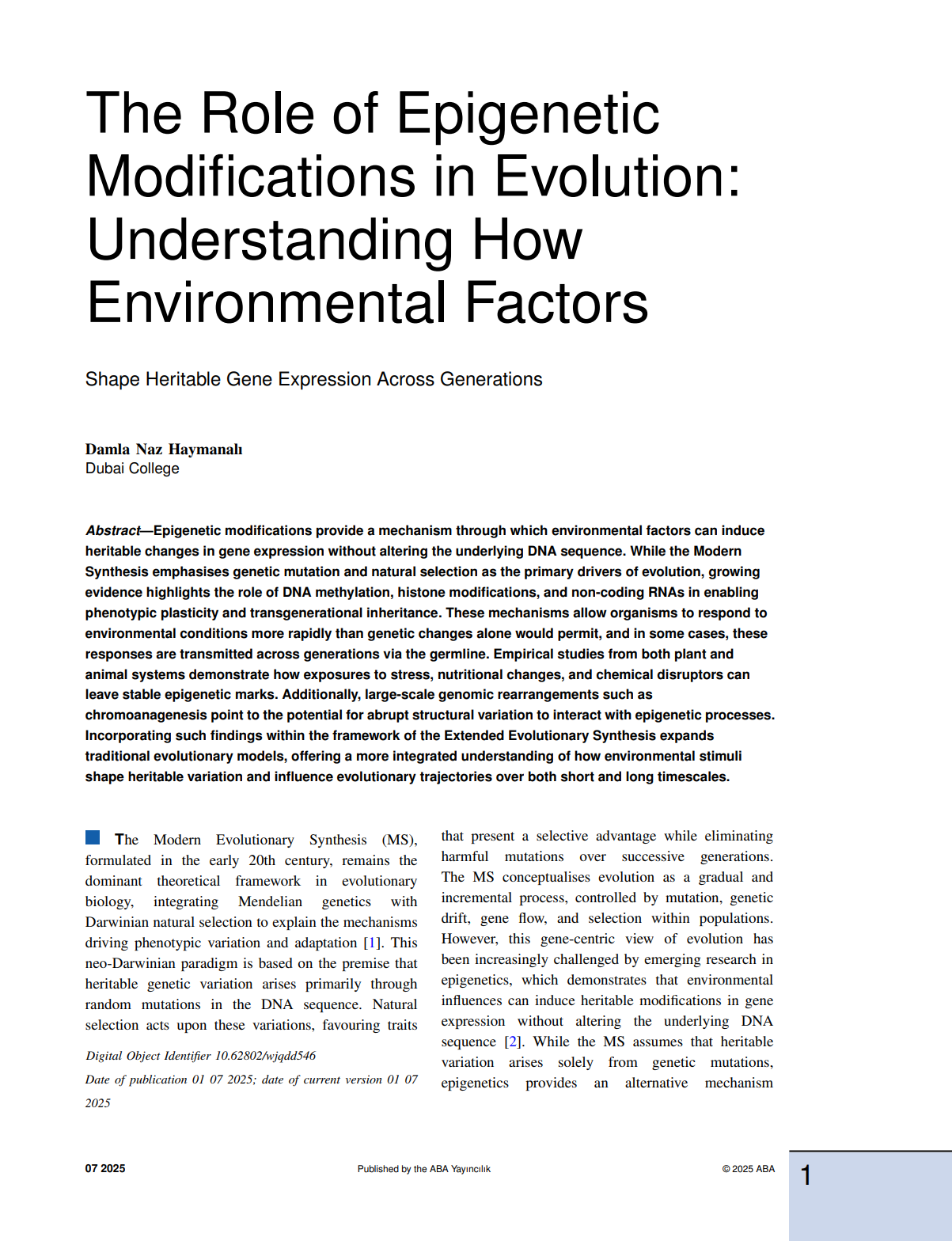The Role of Epigenetic Modifications in Evolution: Understanding How Environmental Factors Shape Heritable Gene Expression Across Generations
DOI:
https://doi.org/10.62802/xyjcdx44Keywords:
epigenetics, gene expression, DNA methylation, histone modification, non-coding RNA, phenotypic plasticity, transgenerational inheritance, environmental stress, chromoanagenesis, extended evolutionary synthesisAbstract
Epigenetic modifications provide a mechanism through which environmental factors can induce heritable changes in gene expression without altering the underlying DNA sequence. While the Modern Synthesis emphasises genetic mutation and natural selection as the primary drivers of evolution, growing evidence highlights the role of DNA methylation, histone modifications, and non-coding RNAs in enabling phenotypic plasticity and transgenerational inheritance. These mechanisms allow organisms to respond to environmental conditions more rapidly than genetic changes alone would permit, and in some cases, these responses are transmitted across generations via the germline. Empirical studies from both plant and animal systems demonstrate how exposures to stress, nutritional changes, and chemical disruptors can leave stable epigenetic marks. Additionally, large-scale genomic rearrangements such as chromoanagenesis point to the potential for abrupt structural variation to interact with epigenetic processes. Incorporating such findings within the framework of the Extended Evolutionary Synthesis expands traditional evolutionary models, offering a more integrated understanding of how environmental stimuli shape heritable variation and influence evolutionary trajectories over both short and long timescales.
References
Huxley J. Evolution: The Modern Synthesis. London: Allen & Unwin; 1942.
Crews D, Gillette R, Scarpino S V., Manikkam M, Savenkova MI, Skinner MK. Epigenetic transgenerational inheritance of altered stress responses. Proceedings of the National Academy of Sciences. 2012 Jun 5;109(23):9143–8.
Bollati V, Baccarelli A. Environmental epigenetics. Heredity (Edinb). 2010 Jul 24;105(1):105–12.
Laland KN, Uller T, Feldman MW, Sterelny K, Müller GB, Moczek A, et al. The extended evolutionary synthesis: its structure, assumptions and predictions. Proceedings of the Royal Society B: Biological Sciences. 2015 Aug 22;282(1813):20151019.
Jaenisch R, Bird A. Epigenetic regulation of gene expression: how the genome integrates intrinsic and environmental signals. Nat Genet. 2003 Mar;33(S3):245–54.
Moore LD, Le T, Fan G. DNA Methylation and Its Basic Function. Neuropsychopharmacology. 2013 Jan 11;38(1):23–38.
Messerschmidt DM, Knowles BB, Solter D. DNA methylation dynamics during epigenetic reprogramming in the germline and preimplantation embryos. Genes Dev. 2014 Apr 15;28(8):812–28.
Zhang Y, Sun Z, Jia J, Du T, Zhang N, Tang Y, et al. Overview of Histone Modification. Adv Exp Med Biol. 2021;1283:1–16.
Arnoult N, Karlseder J. ALT Telomeres Borrow from Meiosis to Get Moving. Cell. 2014 Sep;159(1):11–2.
Wei JW, Huang K, Yang C, Kang CS. Non-coding RNAs as regulators in epigenetics. Oncol Rep. 2017 Jan;37(1):3–9.
Ulitsky I, Bartel David P. lincRNAs: Genomics, Evolution, and Mechanisms. Cell. 2013 Jul;154(1):26–46.
Casas E, Vavouri T. Mechanisms of epigenetic inheritance of variable traits through the germline. Reproduction. 2020 Jun;159(6):R251–63.
Feinberg AP, Irizarry RA. Stochastic epigenetic variation as a driving force of development, evolutionary adaptation, and disease. Proceedings of the National Academy of Sciences. 2010 Jan 26;107(suppl_1):1757–64.
Guerrero-Bosagna C, Covert TR, Haque MdM, Settles M, Nilsson EE, Anway MD, et al. Epigenetic transgenerational inheritance of vinclozolin induced mouse adult onset disease and associated sperm epigenome biomarkers. Reproductive Toxicology. 2012 Dec;34(4):694–707.
Sharma U. Paternal Contributions to Offspring Health: Role of Sperm Small RNAs in Intergenerational Transmission of Epigenetic Information. Frontiers in Cell and Developmental Biology. 2019 Oct 9;7.
McClintock B. The origin and behavior of mutable loci in maize. Proceedings of the National Academy of Sciences. 1950 Jun 1;36(6):344–55.
Rebollo R, Romanish MT, Mager DL. Transposable Elements: An Abundant and Natural Source of Regulatory Sequences for Host Genes. Annual Review of Genetics. 2012 Dec 15;46(1):21–42.
Yehuda R, Daskalakis NP, Lehrner A, Desarnaud F, Bader HN, Makotkine I, et al. Influences of Maternal and Paternal PTSD on Epigenetic Regulation of the Glucocorticoid Receptor Gene in Holocaust Survivor Offspring. American Journal of Psychiatry. 2014 Aug;171(8):872–80.
Anway MD, Cupp AS, Uzumcu M, Skinner MK. Epigenetic transgenerational actions of endocrine disruptors and male fertility. Science (New York, NY) [Internet]. 2005;308(5727):1466–9.
Heijmans BT, Tobi EW, Stein AD, Putter H, Blauw GJ, Susser ES, et al. Persistent epigenetic differences associated with prenatal exposure to famine in humans. Proceedings of the National Academy of Sciences [Internet]. 2008 Oct 27;105(44):17046–9.
Li X, Ito M, Zhou F, Youngson N, Zuo X, Leder P, et al. A Maternal-Zygotic Effect Gene, Zfp57, Maintains Both Maternal and Paternal Imprints. Developmental Cell. 2008 Oct;15(4):547–57.









